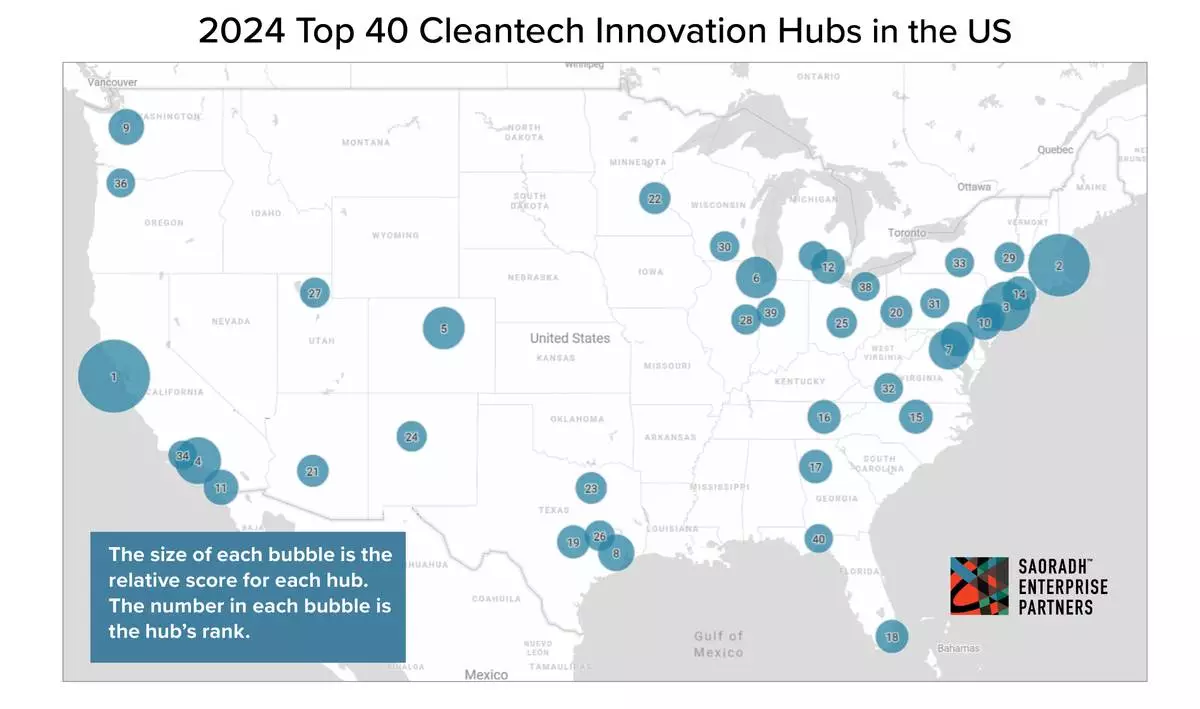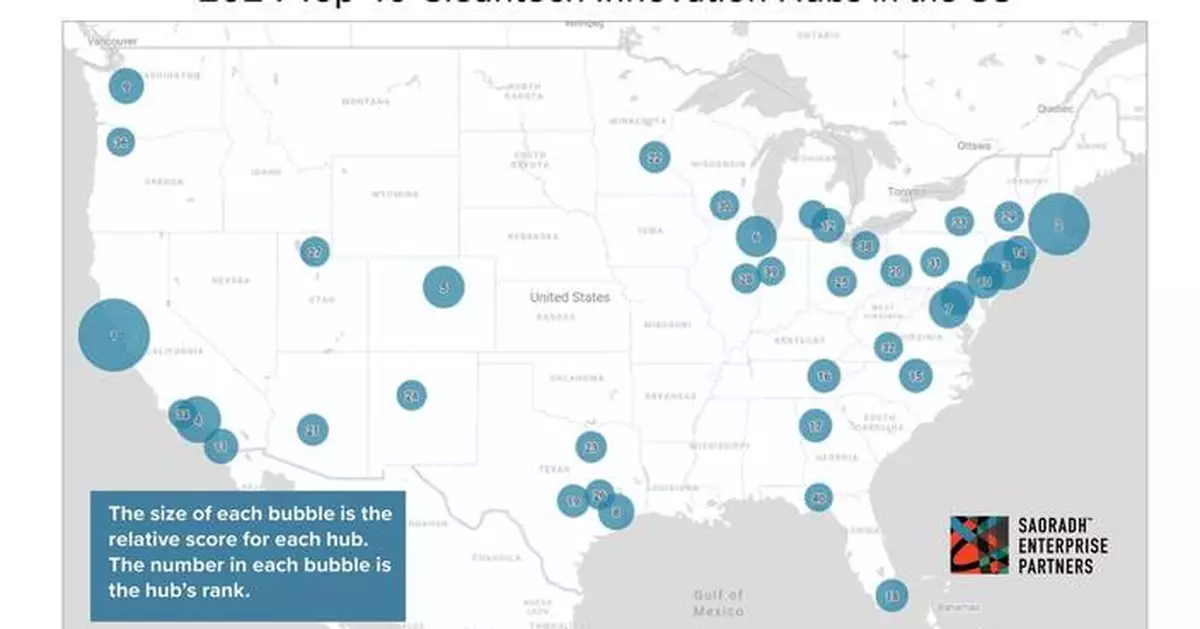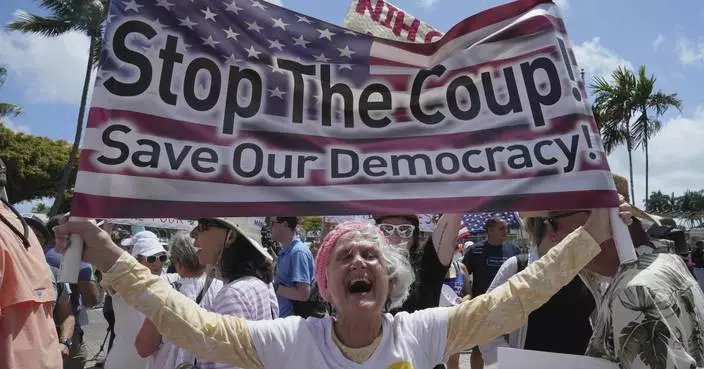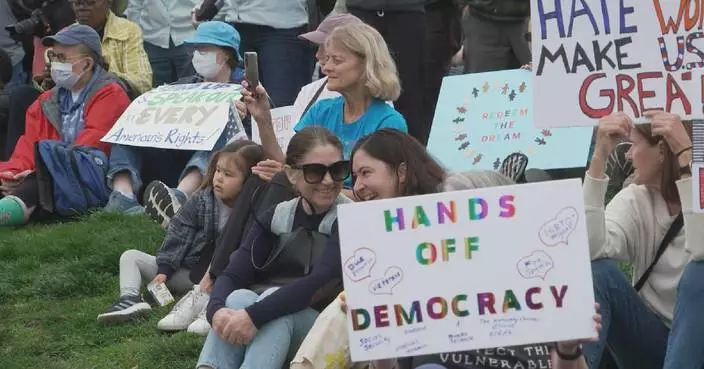BOULDER, Colo.--(BUSINESS WIRE)--Apr 3, 2025--
Saoradh Enterprise Partners (SEP), a Colorado-based venture capital (VC) and research firm, has released the 2024 US Cleantech Innovation Hubs Survey, the second edition of its comprehensive ranking and analysis of cleantech ecosystems across the US. SEP defines innovation hubs as ecosystems driven by research funding, technology development, and venture formation. The report evaluates the 100 leading cleantech hubs in the nation, identifying their strengths, weaknesses, and potential for impact.
This press release features multimedia. View the full release here: https://www.businesswire.com/news/home/20250403938883/en/
In 2025, the urgency for global climate action remains at the forefront, including in the US at the state and metropolitan levels. Investments in cleantech have surged, outpacing fossil fuel investments for the first time. According to PitchBook Data, Inc., global clean energy markets are projected to reach $1.3 trillion in 2025 and $2 trillion in 2030, marking a significant shift toward sustainable energy solutions. VC investments into companies innovating clean energy technologies support this shift, which equaled $17.9 billion in 2024 and $89.4 billion since 2020.
Despite this momentum, many promising cleantech hubs remain overlooked. SEP’s Survey highlighted a cleantech commercialization gap — the disconnect between regions receiving VC funds and those leading in research and development (R&D). While California, Massachusetts, and New York secured 45% of VC cleantech funding, they accounted for only 25% of university R&D cleantech spending. This discrepancy suggests that the nation’s cleantech research remains under-commercialized, slowing decarbonization efforts.
One major challenge contributing to this gap has been the lack of comprehensive datasets on cleantech innovation hubs to inform investors, policy makers, and other stakeholders. This scarcity results in investment decisions that lack an understanding of regional cleantech ecosystems and a rigorous, data-driven analysis necessary to assess technology availability, viability, and market deployment.
“At SEP, we aim to close this commercialization gap by using the Survey as a compass to find great technology and build the companies that commercialize it – and to share its findings with other investors, corporations, economic development agencies, and policymakers to drive optimal cleantech development in the US,” said Paul Nelson, Managing Partner of SEP.
The SEP Survey includes a robust index scoring system with 13 datasets grouped into three stages (research, technology, and venture) to rank cleantech hubs at the granular level of metropolitan statistical areas. The 35-page Survey Whitepaper report and accompanying online Hubs Data System provide access to underlying details. Examples of the Whitepaper’s content include:
Top 10 2024 Cleantech Innovation Hubs
Leaders across the US reviewed the Survey, provided their take on its benefits to cleantech development, and are using it to help solve critical issues such as global warming, including the American Energy Society, Colorado Cleantech, Pitchbook, Governor of Colorado, Research Triangle, Stanford University, Center for Houston’s Future, Energy Capital Ventures, and more.
“It comes as no surprise that the Bay Area continues to rank 1st for innovating and commercializing cleantech, as identified by SEP in the 2024 Cleantech Innovation Hubs Survey. Leveraging the existing ecosystem of large companies, startups, academia, non-profits, and government organizations that exist within these Innovation Hubs is critical to building resilient cleantech ecosystems and to decarbonizing industry.”—Naomi Bones, Managing Director of Stanford University Natural Gas Initiative and Co-Managing Director, Stanford Hydrogen Initiative (Bay Area hub #1)
“Colorado has always been a leader in clean energy technology, and we are proud to be among one of the top in the country. Our cleantech industry creates good-paying jobs that power our economy, while developing innovations that protect our air quality and our state for future generations. While top ten is a good place to be, we won’t rest until we’re #1.” —Colorado Governor Jared Polis (Colorado Cleanrange hub #5)
All quotes can be viewed on SEP’s website. Access to the executive summary, Whitepaper, and online data system here.
About SEP
Saoradh Enterprise Partners (SEP) is an early stage cleantech venture capital and transactional research firm. The firm embodies a new approach to drive commercialization of impactful technologies across all sectors that comprise the cleantech ecosystem.
SEP leverages its innovative market and technology research platform to identify the best cleantech and invest in early stage companies to commercialize opportunities in US innovation hubs The firm partners with innovators, entrepreneurs, and corporations in a balanced approach at the magical intersection of science (what’s possible), finance (what’s bankable), industry (what’s needed), and planet (what matters).
To learn more, visit www.saoradh.com.


Map highlighting the newly announced 2024 Cleantech Innovation Hubs across the United States.
















































